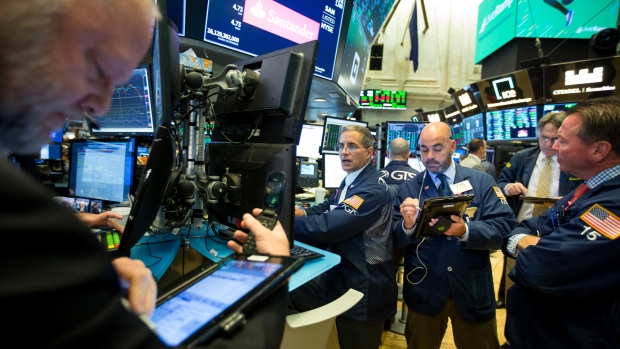Oct 31, 2018
Stocks surge to end rocky October
, Bloomberg News

U.S. stocks rallied on the final day of one of the worst months of the bull market, as earnings from Facebook jolted tech shares higher. The U.S. dollar added to a 16-month high and Treasury yields jumped.
The S&P 500 Index headed for the first back-to-back gains of October, paring its steepest monthly drop since 2011 to 7 per cent. Strong earnings that had largely been ignored in prior days added to the gains. Facebook jumped, General Motors rallied and T-Mobile US advanced. Private payrolls data calmed nerves about the strength of the economy, lifting the dollar. Treasuries fell as the Treasury Department said it will raise the amount of long-term debt it sells this quarter.
In Europe, miners and energy companies led the way as almost every sector on the Stoxx Europe 600 Index climbed. Italian bonds bucked a decline as the risk-on mood sent core European debt lower. The euro drifted down as inflation accelerated in October and underlying price pressures increased, handing policy makers a headache after growth data disappointed. The pound rebounded after Tuesday’s slump.
Equity bulls will be hoping this rebound can last following a series of bounces in the past few weeks that quickly gave way to declines as some US$8 trillion was wiped off stock markets globally. The MSCI All-Country World Index has dropped more than 8 percent in October, poised to post the worst monthly performance since May 2012.
Corporate results may be key to sustaining the share gains: attention will next turn to earnings from Apple Inc. after the close on Thursday. But there are risks in the background, from the American midterm elections to trade talks with China. Meanwhile, the U.S. jobs report is due Friday -- private data surprised to the upside on Wednesday.
In Asia, Japanese stocks were the stand-out performers as indexes rose across the board. China’s overnight repo rate surged the most in more than four years as authorities take steps to combat bets against the yuan, which held near the weakest level in a decade against the greenback. The yen edged lower after the Bank of Japan left its monetary stimulus unchanged and kept its 10-year bond yield target at about zero percent.
Elsewhere, gold fell and oil edged up from a two-month low. In emerging markets, the Indian rupee pared a drop after the finance ministry moved to diffuse growing tensions with the central bank. Developing-nation stocks jumped as currencies edged lower.
And these are the main moves in markets:
Stocks
The S&P 500 Index advanced 0.9 per cent as of 9:31 a.m. New York time. The Stoxx Europe 600 Index surged 1.7 per cent to the highest in almost two weeks on the biggest jump in seven months. Germany’s DAX Index jumped 1.4 per cent to the highest in more than a week on the biggest surge in almost 14 weeks. The MSCI Asia Pacific Index surged 1.6 per cent to the highest in a week on the largest jump in almost eight months. The MSCI Emerging Market Index gained 1.6 per cent to the highest in a week on the biggest rise in almost three weeks.
Currencies
The Bloomberg Dollar Spot Index increased 0.3 per cent to the highest in more than 17 months. The euro fell 0.3 per cent to US$1.1315, the weakest in about 16 months. The British pound advanced 0.3 per cent to US$1.2745. The Japanese yen decreased 0.1 per cent to 113.23 per dollar, the weakest in almost four weeks.
Bonds
The yield on 10-year Treasuries increased three basis points to 3.15 per cent, the highest in more than a week. Germany’s 10-year yield advanced two basis points to 0.39 per cent. Britain’s 10-year yield gained five basis points to 1.447 per cent, the highest in a week on the largest climb in almost four weeks. The spread of Italy’s 10-year bonds over Germany’s declined eight basis points to 3.0309 percentage points.
Commodities
West Texas Intermediate crude advanced 0.1 per cent to US$66.27 a barrel. Gold decreased 0.5 per cent to US$1,217.17 an ounce, the weakest in three weeks.
